2025年牛津译林版英语中考专题复习课件:课题八 动词的种类 (共50张PPT)
文档属性
| 名称 | 2025年牛津译林版英语中考专题复习课件:课题八 动词的种类 (共50张PPT) |

|
|
| 格式 | pptx | ||
| 文件大小 | 1.6MB | ||
| 资源类型 | 教案 | ||
| 版本资源 | 牛津译林版 | ||
| 科目 | 英语 | ||
| 更新时间 | 2025-03-12 18:24:56 | ||
图片预览



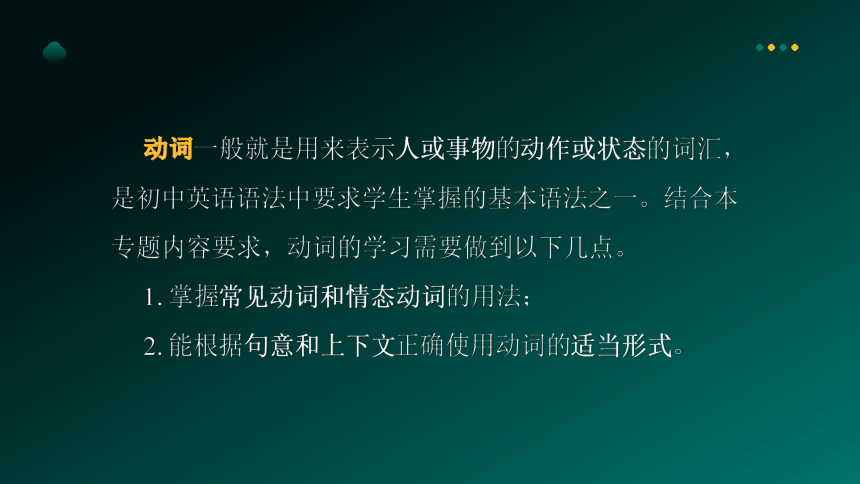

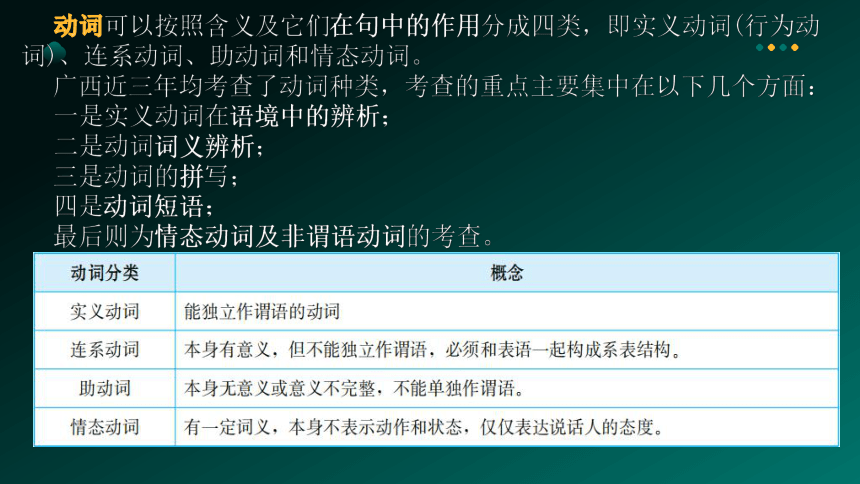

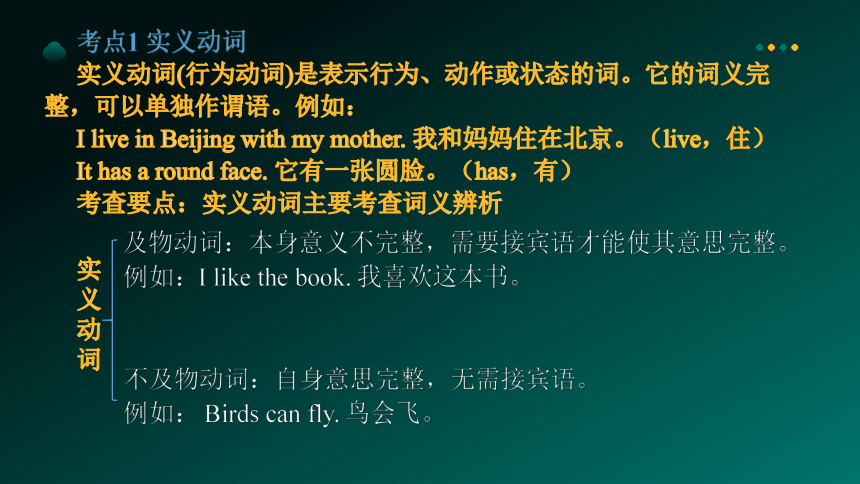
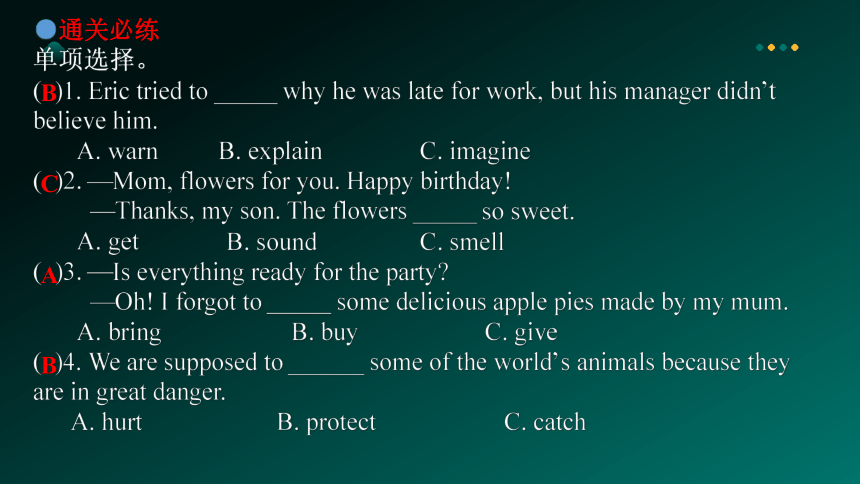
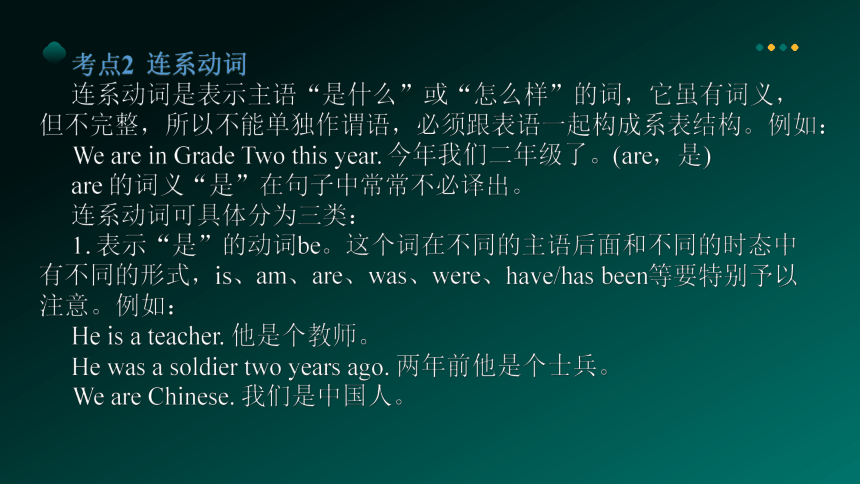

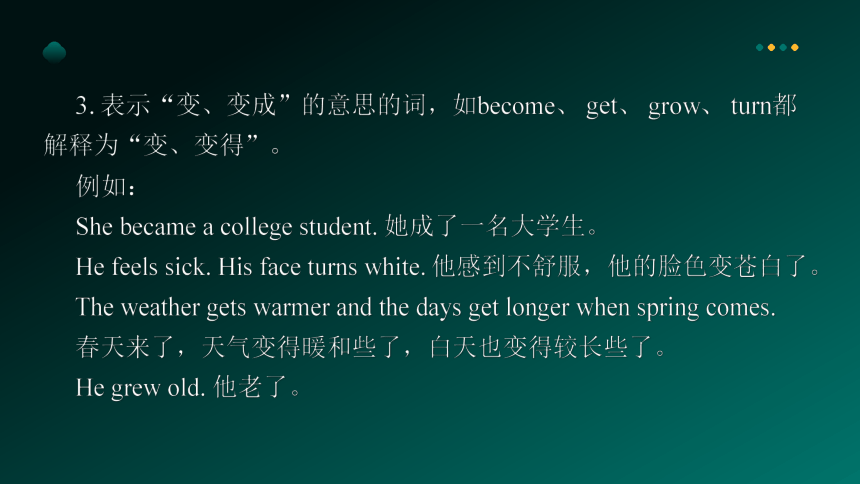
文档简介
(共50张PPT)
2025年英语中考复习
课题八 动词的种类
第二部分 语 法
聚焦中考
壹
动词一般就是用来表示人或事物的动作或状态的词汇,是初中英语语法中要求学生掌握的基本语法之一。结合本专题内容要求,动词的学习需要做到以下几点。
1. 掌握常见动词和情态动词的用法;
2. 能根据句意和上下文正确使用动词的适当形式。
核心知识点
贰
动词可以按照含义及它们在句中的作用分成四类,即实义动词(行为动词)、连系动词、助动词和情态动词。
广西近三年均考查了动词种类,考查的重点主要集中在以下几个方面:
一是实义动词在语境中的辨析;
二是动词词义辨析;
三是动词的拼写;
四是动词短语;
最后则为情态动词及非谓语动词的考查。
考点攻坚
叁
考点1 实义动词
实义动词(行为动词)是表示行为、动作或状态的词。它的词义完整,可以单独作谓语。例如:
I live in Beijing with my mother. 我和妈妈住在北京。(live,住)
It has a round face. 它有一张圆脸。(has,有)
考查要点:实义动词主要考查词义辨析
实
义
动
词
及物动词:本身意义不完整,需要接宾语才能使其意思完整。
例如:I like the book. 我喜欢这本书。
不及物动词:自身意思完整,无需接宾语。
例如: Birds can fly. 鸟会飞。
●通关必练
单项选择。
( )1. Eric tried to _____ why he was late for work, but his manager didn’t believe him.
A. warn B. explain C. imagine
( )2. —Mom, flowers for you. Happy birthday!
—Thanks, my son. The flowers _____ so sweet.
A. get B. sound C. smell
( )3. —Is everything ready for the party
—Oh! I forgot to _____ some delicious apple pies made by my mum.
A. bring B. buy C. give
( )4. We are supposed to ______ some of the world’s animals because they are in great danger.
A. hurt B. protect C. catch
B
C
A
B
考点2 连系动词
连系动词是表示主语“是什么”或“怎么样”的词,它虽有词义,但不完整,所以不能单独作谓语,必须跟表语一起构成系表结构。例如:
We are in Grade Two this year. 今年我们二年级了。(are,是)
are 的词义“是”在句子中常常不必译出。
连系动词可具体分为三类:
1. 表示“是”的动词be。这个词在不同的主语后面和不同的时态中有不同的形式,is、am、are、was、were、have/has been等要特别予以注意。例如:
He is a teacher. 他是个教师。
He was a soldier two years ago. 两年前他是个士兵。
We are Chinese. 我们是中国人。
2. 表示“感觉”的词,包括look(看起来)、feel(觉得,摸起来)、smell(闻起来)、sound(听起来)、taste(尝起来)等。例如:
She looked tired. 她看上去很疲劳。
I feel ill. 我觉得不舒服。
Cotton feels soft. 棉花摸起来很软。
The story sounds interesting. 这个故事听起来很有趣。
The flowers smell sweet. 这些花闻起来很香。
The mixture tasted horrible. 这汤太难喝了。
3. 表示“变、变成”的意思的词,如become、 get、 grow、 turn都解释为“变、变得”。
例如:
She became a college student. 她成了一名大学生。
He feels sick. His face turns white. 他感到不舒服,他的脸色变苍白了。
The weather gets warmer and the days get longer when spring comes.
春天来了,天气变得暖和些了,白天也变得较长些了。
He grew old. 他老了。
●难点解析
注意区别以下动词的用法,它们既可以作为行为动词,又可以作为连系动词。
1. look 看,看起来
He is looking at the picture. 他正在看这张图片。(行为动词)
It looks beautiful. 它看上去很美丽。(连系动词)
2. feel 摸,感觉
I felt someone touch my arm. 我感到有人碰我的手臂。(行为动词)
Are you feeling better today than before
今天你感觉比之前好些了吗?(连系动词)
3. smell 嗅,闻起来
My little brother likes to smell the apple before he eats it.
我的小弟弟喜欢在吃苹果前闻一闻。(行为动词)
Great! The flowers smell nice. 这些花闻起来多香啊!(连系动词)
4. sound 弄响,发音,听起来
The letter “h” in hour is not sounded.
在hour这个词中字母h是不发音的。(行为动词)
The gun sounded much closer. 枪声听起来更近了。(连系动词)
5. taste 辨味,尝起来
Please taste the soup. 请尝一口汤。(行为动词)
The soup tastes terrible. 这汤尝起来味道太差了。(连系动词)
6. get 得到,获得,变
There are some bananas on the table. Each of you can get one.
桌上有些香蕉。你们每个人可以拿一个。(行为动词)
Put the fish in the fridge, or it will go bad in hot weather.
将鱼放到冰箱里,否则在酷热的天气里会变坏。(连系动词)
7. grow 生长,种植,变
Do you grow rice in your country 你们的国家种水稻吗?(行为动词)
It’s too late. It’s growing dark. 太迟了。天渐渐变暗了。(连系动词)
8. turn 转动,翻动,使变得,变
The earth turns around the sun. 地球绕着太阳转。(行为动词)
When spring comes, the trees turn green and the flowers come out.
春天来临时,树叶变绿,花儿绽放。(连系动词)
上述句子中的动词,如grow、get、turn等,既可以作连系动词,又可以作行为动词。如何来辨别它们呢?有一个最简便的方法,即如果用连系动词be替换句子中的这些动词,句子仍然成立,那么该动词就是连系动词;反之,不能替换的,就是行为动词。例如:
The trees turn/are green when spring comes. 春天来临,树叶变绿。
The earth turns around the sun. 地球绕着太阳转。
第二句句子中的turn是行为动词,意为“转动”。无法用is替换。
●通关必练
( )1. —Dinner is ready. Help yourself, please!
—Wow! It _____ delicious.
A. tastes B. sounds C. turns
( )2. The soup _____ a little salty. There is no need to add more salt.
A. smells B. sounds C. tastes
( )3. —Paul, have you tried this chicken It’s a special in Luzhou and has been introduced in the TV program A Bite of China.
—Yes, it _____ hot but delicious.
A. eats B. looks C. tastes
( )4. —Amazing! Tom got the best grade in the test last week.
—Nothing _____ impossible. He studies really hard this term.
A. is B. are C. have
A
C
C
A
考点3 助动词
助动词一般无词义,不能单独作谓语,而是在句中帮助实义动词构成各种时态、语态、语气、否定和疑问结构等。助动词包括shall、will、should、would、be、have、do等。
Some boys are playing on the grass.
一些男孩正在草地上玩。(构成进行时态)
Mother is written by Gorky.
《母亲》是高尔基写的。(构成被动语态)
Do you see my point
你明白我的意思吗?(构成疑问结构)
1. 助动词be
①be+现在分词,构成进行时态。
They are playing football in the garden.
他们正在花园里踢足球。(现在进行时)
Yesterday afternoon we were discussing a new teaching plan.
昨天下午我们在讨论一个新的教学计划。(过去进行时)
②be+过去分词,构成被动语态。
The book is written by John. 这本书是约翰写的。
③be+to do有以下几种用法。
a. 表示事先安排或计划要做的事。
We are to discuss the report next Wednesday.
我们将于下周三讨论这个报告。
b. 表示“必须”,相当于should和ought to。
You are to finish your homework before you watch TV.
你得先完成作业才能看电视。
c. 表示责任、义务。
Who is to blame 该责备谁?
【注意】be to blame只用主动形式。
d. 在if条件句中,表示意愿,相当于“想要,打算”。
If we are to be at the station by 9 o’clock, we must start off right now.
如果我们想在9点之前赶到车站,现在必须动身。
e. be to have done 表示本打算做,事实上没有做成。
I was to have seen him last Wednesday but he did not come.
我本来上周三就能见到他的,可他没来。
f. 否定形式be not to do,常用来表示禁止。
Mother often says you are not to climb the trees.
母亲常说你们不要爬树。
④be about to do. … 即将做……
I was about to speak, but Mary spoke first.
我正要讲话,但玛丽先开口了。
【注意】be about to不与具体的时间状语连用,但可与when连用构成be about to do…when…句式。
I was about to leave when the telephone rang.
我正要离开,这时电话响了。
(误)We are about to start off at six.
(正)We are starting off at six.
(正)We will start off at six. 我们将于6点出发。
2. 助动词have
①构成完成时态。
助动词have与过去分词构成完成时态。
You haven’t been abroad before, have you
你以前没出过国,是吧?(现在完成时)
We hadn’t walked far when we lost our way.
我们没走多远就迷路了。(过去完成时)
We will have finished all the work by next week.
到下周为止,我们就会完成所有的工作。(将来完成时)
②构成分词的完成时形式。
Having lived in London for years, I know every place of the city very well. 住在伦敦多年了,我对这个城市的每个地方都很熟悉。
③构成虚拟语气。
在表示对“过去”的虚拟时,if从句中用had done结构,主句中用would/could/might have done的形式。
If they had had time yesterday, they would certainly have come and helped us. 如果他们昨天有时间,他们一定会来帮助我们。
3. 助动词do
①do帮助构成否定句和疑问句。
Do you know each other 你们两个认识吗?
I did not/didn’t sleep well last night. 我昨夜睡得不好。
②“do not/don’t+动词原形”构成否定的祈使句。
Don’t be so careless. 不要那么粗心大意。
③do在谓语动词前用来加强语气。
I do wish you will come. 我真的希望你会来。
She does like ice cream!她真的太喜欢冰激凌了!
They did go there. 他们的确去了那里。
④用于部分倒装句中,强调only、never、rarely等词。
Never did I expect to see him there. 我从未想到会在那里看到他。
⑤do还可用来代替实义动词,以避免重复。
He works even harder than you do. 他工作起来比你还要努力。
—Have you written to her yet 你已经写信给她了吗?
—Yes. I did yesterday. 是的。我昨天写了。
【注意】
do不能代替be或其他助动词或情态动词作实义动词,这时在疑问句和否定句中仍要加助动词。例如:
What did you do this morning
你今天早上做什么了?
4. 助动词shall
shall作助动词时本身无词义,用于第一人称的将来时中,后接动词原形。
Don’t worry. We shall tell you all about it.
你别担心。我们会把这件事全告诉你的。
5. 助动词will
will作助动词时本身无词义,多用在第二、三人称的将来时中,后接动词原形,也可用于第一人称的句子中。
He will be twenty-five years old next month. 他下个月就满25岁了。
6. 助动词should
should作助动词,同时是shall的过去式,本身没有词义,用于第一人称的过去将来时中,后接动词原形。
We hoped that we should be able to do that.
我们希望我们能做那件事。
7. 助动词would
would作助动词,同时是will的过去式,本身没有词义,用于第二、三人称的过去将来时中,后接动词原形,也可用于第一人称的句子中。
He said he would come. 他说过他会来的。
( )1. The news _____ very interesting! Tell me more!
A. is B. were C. was
( )2. —Is she reading a message
—________
A. No, she isn’t. B. No, she doesn’t.
C. Yes, she is reading.
( )3. Where _____ they have lunch last weekend
A. do B. are C. did
( ) 4. _____ they _____ their housework at home now
A. Did;do B. /;do C. Are;doing
A
A
C
C
●通关必练
( )5. Tony _____ from China. Betty_____ from England.
A. is;is B. is;are C. are;is
( )6. —_____ your father a manager
—Yes. He works in a hotel.
A. Is B. Was C. Does
( )7. —How old ____ you
—I _____ thirteen.
A. are;is B. is;am C. are;am
A
A
C
考点4 情态动词
1. 情态动词分类及考点
情态动词 意义及用法 示例
can (can’t) “能,会”,表示一种能力;否定形式表示不允许 Daisy can play the piano well.
黛西钢琴弹得很好。
Can I use your bike to the downtown
我可以用你的自行车去市中心吗
could (couldn’t) could是can的过去式,表示过去的能力;用在疑问句中,表示委婉请求 He could swim at the age of six.
他6岁时就会游泳了。
Could I use your computer
我能用下你的电脑吗
will (won’t) 表示询问、请求,用于疑问句中,常与第二人称连用 Will you please turn off the TV
请关上电视,好吗
may “可以”,表示请求、许可 You may come with me if you want. 如果你愿意,你可以和我一起来。
“希望”,表示祝福和愿望 May you be happy!
祝你快乐!
might might是may的过去式,表示请求、许可时,语气比may更委婉 Might I open the window
我能打开窗户吗
must (mustn’t) “必须”,多表示主观意愿;否定形式表示一定不要、禁止 You must come on time.
你必须按时来。
You mustn’t play on the road.
你不能在路上玩。
have to (don’t have to) “不得不”,多表示客观;否定形式表示不需要、没必要 We have to stay at home because it's raining. 我们不得不待在家里,因为正在下雨。
shall 用于主语是第一人称、第三人称的疑问句中,表示询问或征求意见 Shall we go fishing this weekend
我们这周末去钓鱼怎么样
一般用于第二、第三人称的陈述句中表示决心、命令、警告等 You shall not smoke here.
你不应该在这里吸烟。
should (shouldn’t) “应该”,表示责任和义务;也可以表示劝告或建议 We should clean the classroom everyday.
我们应该每天打扫教室。
ought to You ought to teach them carefully.
你应该仔细地教他们。
need (needn’t) “需要”,主要用于否定句和疑问句 You needn’t do that again.
你不需要再那么做了
had better (had better not) “最好” You’d better come here earlier.
你最好早点来这里。
【注意】 Must… 否定回答为:No, 主语+needn’t/don’t have to.
may引出的一般疑问句,肯定回答用may;否定回答用can’t/mustn’t。例如:
—May I come in 我可以进来吗?
—Yes, please!/Yes, you may. 可以。
—No, you can’t/mustn’t. 不可以。
2. 情态动词表推测
情态动词 表推测 意义及用法 例句
must 肯定 推测 “一定,肯定”,表示非常有把握的肯定推测 The book must be Lucy’s, for I can see her name on the cover.这本书一定是露西的,因为我看到封面上有她的名字。
may “也许,有可能”,表示把握不大的肯定推测 I’m not sure. I may/might go to England. 我不确定。我可能会去英国。
might “或许”,可能性小于may,语气缓和,比较委婉 I'm not sure. I might go abroad for further study.
我不确定。我可能会出国深造。
can’t 否定 推测 “一定不,不可能”,表示否定推测,语气强烈,可能性几乎为零 The man in black can’t be Mr Li. He has gone to Beijing.穿黑衣服的不可能是李老师。他已经去北京了。
may not “可能不”,表示否定推测语气较弱 These may not be his basketball shoes. 这些可能不是他的篮球鞋。
●易错点
(1)辨析can/could与be able to
can强调自身具备的能力,过去式是could。
be able to+动词原形意为“能够”,强调经过努力而获得的能力,可用于多个时态。
一般现在时: am/is/are able to
一般过去时: was/were able to
一般将来时:will be able to
现在完成时:have/has been able to
(2)辨析can’t 与mustn’t
can’t 意为“不可能”,表示否定推测。例如:
The red bag can’t be hers. 这个红色的包不可能是她的。
mustn’t 意为“禁止,不允许”,不表示推测。
You mustn’t watch TV during the meals. 吃饭时你不能看电视。
●通关必练
( )1. —Sam, ______ I join you in the community service
—Of course you can.
A. can B. must C. should
( )2. According to the new regulation(规定), school students _____
take their cell phones to the classroom.
A. wouldn’t B. needn’t C. mustn’t
( )3. My classmate is running so fast! I ______ believe my eyes.
A. can’t B. needn’t C. mustn’t
A
C
A
( )4. “Gina, whose book is this ”“It ______ be Carla’s. Charles Dickens is her favorite writer.”
A. must B. can C. may
( )5. —How long can I keep these books
—According to the library rules, you _____ return them within 7 days.
A. must B. might C. could
( )6. There is no light on. They ______ be at home.
A. mustn’t B. can’t C. needn’t
( )7. We ______ have a graduation ceremony next week, but I’m not sure.
A. must B. need C. might
A
A
B
C
考点5 非谓语动词
非谓语动词包括三种形式:不定式、动名词和分词。
1. 不定式
(1)基本形式:to+动词原形 (在某些情况下可以不带to)
(2)与谓语动词的区别见下表。
(3)常见用法:
①作主语。例如 :To see is to believe. 眼见为实。
常用it作形式主语,结构为:it’s+adj. +for sb./of sb.+to do sth. 例如:
It is useful to learn English well. 学好英语很有用。
②作表语。例如:The important thing is to see. 重要的事情是去看。
③作宾语。
A. 动词 + to do,动词包括agree、decide、fail、 hope、 wish、 want、 plan等。
B. 动词+疑问词 + to do,例如:
I don’t know what to do. 我不知道干什么。
C. 动词 + it(形式宾语)+宾补 +to do
例如:I find it important to learn English. 我发现学习英语很重要。
D. 常见的不带to的动词不定式作宾语结构: why not、 had better(not)、would rather、could/would you please(not) 等。
④作宾补。
A. 动词+宾语+to do,例如:
Li Mei asked me to show her the new dictionary. 李梅让我给她看新词典。
【注意】有以上结构的常用动词有tell、wish、ask、want、invite、allow、encourage、advise 等。
B. 动词+宾语+do (不带to的不定式)
【注意】
常用的动词有感官动词hear、see、watch、feel、notice,使役动词 have、make、let等。这些词变被动语态时则必须加上to。例如:
The boss made them work the whole night.
They were made to work the whole night by the boss.
老板让他们整夜干活。
⑤作定语。(必须后置)例如:
He is the last person to leave the office after work.
他是下班后最后一个离开办公室的人。
作定语的不定式如果是不及物动词,不定式后面须有相应的介词。例如:
The Browns have a comfortable house to live in.
布朗一家有一所舒适的房子可以住。
但是不定式所修饰的名词如果是time、place或way时,不定式后面的介词需省略。例如:
It is a wonderful place to live. 这是一个居住的好地方。
⑥作状语。
可以表目的、结果或原因。例如:
He got up early to catch the first bus. 他早起床为的是赶上早班车。
2. 动名词
(1)基本形式:动词原形+-ing
(2)特点:①有时态和语态的变化;②具有名词、动词的一些特征。
(3)常见用法:①作主语。例如:Seeing is believing. 眼见为实。
②作宾语。
A. 只能接动名词作宾语的动词有finish、mind、keep、practice、enjoy、consider等。
B. 既可接动词不定式又可接动名词作宾语的动词有两类:
意义相似:begin、start、like、love、hate、prefer等。
意义不同:remember、forget、stop、try等。
③作表语。例如:His favorite sport is playing basketball.
他最喜欢的运动是打篮球。
④作定语。shopping basket、finishing line、reading room等。
3. 分词
(1)现在分词。基本形式:动词原形+-ing
developing country 发展中国家(现在分词表示主动和进行)
(2)过去分词。基本形式: 规则动词加-ed 或不规则动词的过去分词
developed country 发达国家(过去分词表示被动和完成)
The boy named Kangkang is my good friend.
那个叫康康的男孩是我的好朋友。
●通关必练
( )1. He gave us some advice on how ______ English.
A. learning B. learned C. to learn
( )2. She can’t help ______ the house because she’s busy making a cake.
A. to clean B. cleaning C. cleaned
( )3. I’m thirsty. Would you please give me something _______.
A. drunk B. to drink C. for drinking
( )4. Would you mind ______ your radio a little
A. turn off B. turning off C. turning down
C
A
B
C
靶向突破
肆
●提分必练
单项选择。
( )1. Now most young people like shopping online because they ______ spend a lot of time going from shop to shop.
A. needn’t B. can’t C. mustn’t
( )2. Thanks to their help, the machine ______ working again.
A. started B. stopped C. practised
( )3. Everyone in my grade is busy studying these days to ______
themselves for the final exams.
A. prepare B. present C. provide
( )4. —Presidents in the USA often _____ to keep their campaign(竞选) promises.
—Yes. But few Americans complain about it.
A. try B. manage C. fail
A
A
A
C
( )5. — _________ sweet music! Do you like it
—Um, it ______ beautiful!
A. How a; sounds B. What a; listens C. What; sounds ( )6. Our soccer team _____ all the other football teams and _____
first prize last weekend.
A. beat; won B. won; beat C. win; beat
( )7. Alice often ______ the fun of doing DIY with us. She is so
creative!
A. shares B. provides C. makes
( )8. The workers met some difficulties but _____ the task ten days
ahead of time.
A. increased B. finished C. mentioned
C
A
A
B
●真金火炼
单项选择。
( )1. (2023·常州) You should your cars lowly when passing a school.
A. drive B. clean C. repair
( )2. (2024·崇左) —What do you think of the chicken soup, Helen
—It really good. I’d like to drink more.
A. tastes B. feels C. sounds
( )3. (2024·桂林) —Dad, let’s early to do exercise tomorrow morning.
—OK, no problem.
A. look up B. getup C. give up
( )4. (2022·百色) Listen! The birds in the tree.
A. sing B. sang C. are singing
A
A
B
C
( )5. (2022·湖北) People may use different body language the same feeling.
A. show B. to show
C. showed D. shows
( )6. (2023·海口) —Excuse me, may I use your dictionary I mine behind. —Sure, here you are.
A. leave B. have left
C. will leave D. was leaving
( )7. (2024·常州) It’s reported that China plans astronauts to the moon before 2030.
A. to send B. sending C. send
B
B
A
( )8. (2023·南京) —Look! Is the girl Alice
—No, it be her. She is on a tour in Beijing now.
A. can B. can’t
C. must D. mustn’t
( )9. (2024·重庆 ) —Do you know the Spring Festival became a UN Floating Holiday in 2024
—Yes. The Spring Festival widely in the world nowadays.
A. is celebrated
B. was celebrated
C. will be celebrated
B
A
知 识 梳 理
巩 固 训
2025年英语中考复习
课题八 动词的种类
第二部分 语 法
聚焦中考
壹
动词一般就是用来表示人或事物的动作或状态的词汇,是初中英语语法中要求学生掌握的基本语法之一。结合本专题内容要求,动词的学习需要做到以下几点。
1. 掌握常见动词和情态动词的用法;
2. 能根据句意和上下文正确使用动词的适当形式。
核心知识点
贰
动词可以按照含义及它们在句中的作用分成四类,即实义动词(行为动词)、连系动词、助动词和情态动词。
广西近三年均考查了动词种类,考查的重点主要集中在以下几个方面:
一是实义动词在语境中的辨析;
二是动词词义辨析;
三是动词的拼写;
四是动词短语;
最后则为情态动词及非谓语动词的考查。
考点攻坚
叁
考点1 实义动词
实义动词(行为动词)是表示行为、动作或状态的词。它的词义完整,可以单独作谓语。例如:
I live in Beijing with my mother. 我和妈妈住在北京。(live,住)
It has a round face. 它有一张圆脸。(has,有)
考查要点:实义动词主要考查词义辨析
实
义
动
词
及物动词:本身意义不完整,需要接宾语才能使其意思完整。
例如:I like the book. 我喜欢这本书。
不及物动词:自身意思完整,无需接宾语。
例如: Birds can fly. 鸟会飞。
●通关必练
单项选择。
( )1. Eric tried to _____ why he was late for work, but his manager didn’t believe him.
A. warn B. explain C. imagine
( )2. —Mom, flowers for you. Happy birthday!
—Thanks, my son. The flowers _____ so sweet.
A. get B. sound C. smell
( )3. —Is everything ready for the party
—Oh! I forgot to _____ some delicious apple pies made by my mum.
A. bring B. buy C. give
( )4. We are supposed to ______ some of the world’s animals because they are in great danger.
A. hurt B. protect C. catch
B
C
A
B
考点2 连系动词
连系动词是表示主语“是什么”或“怎么样”的词,它虽有词义,但不完整,所以不能单独作谓语,必须跟表语一起构成系表结构。例如:
We are in Grade Two this year. 今年我们二年级了。(are,是)
are 的词义“是”在句子中常常不必译出。
连系动词可具体分为三类:
1. 表示“是”的动词be。这个词在不同的主语后面和不同的时态中有不同的形式,is、am、are、was、were、have/has been等要特别予以注意。例如:
He is a teacher. 他是个教师。
He was a soldier two years ago. 两年前他是个士兵。
We are Chinese. 我们是中国人。
2. 表示“感觉”的词,包括look(看起来)、feel(觉得,摸起来)、smell(闻起来)、sound(听起来)、taste(尝起来)等。例如:
She looked tired. 她看上去很疲劳。
I feel ill. 我觉得不舒服。
Cotton feels soft. 棉花摸起来很软。
The story sounds interesting. 这个故事听起来很有趣。
The flowers smell sweet. 这些花闻起来很香。
The mixture tasted horrible. 这汤太难喝了。
3. 表示“变、变成”的意思的词,如become、 get、 grow、 turn都解释为“变、变得”。
例如:
She became a college student. 她成了一名大学生。
He feels sick. His face turns white. 他感到不舒服,他的脸色变苍白了。
The weather gets warmer and the days get longer when spring comes.
春天来了,天气变得暖和些了,白天也变得较长些了。
He grew old. 他老了。
●难点解析
注意区别以下动词的用法,它们既可以作为行为动词,又可以作为连系动词。
1. look 看,看起来
He is looking at the picture. 他正在看这张图片。(行为动词)
It looks beautiful. 它看上去很美丽。(连系动词)
2. feel 摸,感觉
I felt someone touch my arm. 我感到有人碰我的手臂。(行为动词)
Are you feeling better today than before
今天你感觉比之前好些了吗?(连系动词)
3. smell 嗅,闻起来
My little brother likes to smell the apple before he eats it.
我的小弟弟喜欢在吃苹果前闻一闻。(行为动词)
Great! The flowers smell nice. 这些花闻起来多香啊!(连系动词)
4. sound 弄响,发音,听起来
The letter “h” in hour is not sounded.
在hour这个词中字母h是不发音的。(行为动词)
The gun sounded much closer. 枪声听起来更近了。(连系动词)
5. taste 辨味,尝起来
Please taste the soup. 请尝一口汤。(行为动词)
The soup tastes terrible. 这汤尝起来味道太差了。(连系动词)
6. get 得到,获得,变
There are some bananas on the table. Each of you can get one.
桌上有些香蕉。你们每个人可以拿一个。(行为动词)
Put the fish in the fridge, or it will go bad in hot weather.
将鱼放到冰箱里,否则在酷热的天气里会变坏。(连系动词)
7. grow 生长,种植,变
Do you grow rice in your country 你们的国家种水稻吗?(行为动词)
It’s too late. It’s growing dark. 太迟了。天渐渐变暗了。(连系动词)
8. turn 转动,翻动,使变得,变
The earth turns around the sun. 地球绕着太阳转。(行为动词)
When spring comes, the trees turn green and the flowers come out.
春天来临时,树叶变绿,花儿绽放。(连系动词)
上述句子中的动词,如grow、get、turn等,既可以作连系动词,又可以作行为动词。如何来辨别它们呢?有一个最简便的方法,即如果用连系动词be替换句子中的这些动词,句子仍然成立,那么该动词就是连系动词;反之,不能替换的,就是行为动词。例如:
The trees turn/are green when spring comes. 春天来临,树叶变绿。
The earth turns around the sun. 地球绕着太阳转。
第二句句子中的turn是行为动词,意为“转动”。无法用is替换。
●通关必练
( )1. —Dinner is ready. Help yourself, please!
—Wow! It _____ delicious.
A. tastes B. sounds C. turns
( )2. The soup _____ a little salty. There is no need to add more salt.
A. smells B. sounds C. tastes
( )3. —Paul, have you tried this chicken It’s a special in Luzhou and has been introduced in the TV program A Bite of China.
—Yes, it _____ hot but delicious.
A. eats B. looks C. tastes
( )4. —Amazing! Tom got the best grade in the test last week.
—Nothing _____ impossible. He studies really hard this term.
A. is B. are C. have
A
C
C
A
考点3 助动词
助动词一般无词义,不能单独作谓语,而是在句中帮助实义动词构成各种时态、语态、语气、否定和疑问结构等。助动词包括shall、will、should、would、be、have、do等。
Some boys are playing on the grass.
一些男孩正在草地上玩。(构成进行时态)
Mother is written by Gorky.
《母亲》是高尔基写的。(构成被动语态)
Do you see my point
你明白我的意思吗?(构成疑问结构)
1. 助动词be
①be+现在分词,构成进行时态。
They are playing football in the garden.
他们正在花园里踢足球。(现在进行时)
Yesterday afternoon we were discussing a new teaching plan.
昨天下午我们在讨论一个新的教学计划。(过去进行时)
②be+过去分词,构成被动语态。
The book is written by John. 这本书是约翰写的。
③be+to do有以下几种用法。
a. 表示事先安排或计划要做的事。
We are to discuss the report next Wednesday.
我们将于下周三讨论这个报告。
b. 表示“必须”,相当于should和ought to。
You are to finish your homework before you watch TV.
你得先完成作业才能看电视。
c. 表示责任、义务。
Who is to blame 该责备谁?
【注意】be to blame只用主动形式。
d. 在if条件句中,表示意愿,相当于“想要,打算”。
If we are to be at the station by 9 o’clock, we must start off right now.
如果我们想在9点之前赶到车站,现在必须动身。
e. be to have done 表示本打算做,事实上没有做成。
I was to have seen him last Wednesday but he did not come.
我本来上周三就能见到他的,可他没来。
f. 否定形式be not to do,常用来表示禁止。
Mother often says you are not to climb the trees.
母亲常说你们不要爬树。
④be about to do. … 即将做……
I was about to speak, but Mary spoke first.
我正要讲话,但玛丽先开口了。
【注意】be about to不与具体的时间状语连用,但可与when连用构成be about to do…when…句式。
I was about to leave when the telephone rang.
我正要离开,这时电话响了。
(误)We are about to start off at six.
(正)We are starting off at six.
(正)We will start off at six. 我们将于6点出发。
2. 助动词have
①构成完成时态。
助动词have与过去分词构成完成时态。
You haven’t been abroad before, have you
你以前没出过国,是吧?(现在完成时)
We hadn’t walked far when we lost our way.
我们没走多远就迷路了。(过去完成时)
We will have finished all the work by next week.
到下周为止,我们就会完成所有的工作。(将来完成时)
②构成分词的完成时形式。
Having lived in London for years, I know every place of the city very well. 住在伦敦多年了,我对这个城市的每个地方都很熟悉。
③构成虚拟语气。
在表示对“过去”的虚拟时,if从句中用had done结构,主句中用would/could/might have done的形式。
If they had had time yesterday, they would certainly have come and helped us. 如果他们昨天有时间,他们一定会来帮助我们。
3. 助动词do
①do帮助构成否定句和疑问句。
Do you know each other 你们两个认识吗?
I did not/didn’t sleep well last night. 我昨夜睡得不好。
②“do not/don’t+动词原形”构成否定的祈使句。
Don’t be so careless. 不要那么粗心大意。
③do在谓语动词前用来加强语气。
I do wish you will come. 我真的希望你会来。
She does like ice cream!她真的太喜欢冰激凌了!
They did go there. 他们的确去了那里。
④用于部分倒装句中,强调only、never、rarely等词。
Never did I expect to see him there. 我从未想到会在那里看到他。
⑤do还可用来代替实义动词,以避免重复。
He works even harder than you do. 他工作起来比你还要努力。
—Have you written to her yet 你已经写信给她了吗?
—Yes. I did yesterday. 是的。我昨天写了。
【注意】
do不能代替be或其他助动词或情态动词作实义动词,这时在疑问句和否定句中仍要加助动词。例如:
What did you do this morning
你今天早上做什么了?
4. 助动词shall
shall作助动词时本身无词义,用于第一人称的将来时中,后接动词原形。
Don’t worry. We shall tell you all about it.
你别担心。我们会把这件事全告诉你的。
5. 助动词will
will作助动词时本身无词义,多用在第二、三人称的将来时中,后接动词原形,也可用于第一人称的句子中。
He will be twenty-five years old next month. 他下个月就满25岁了。
6. 助动词should
should作助动词,同时是shall的过去式,本身没有词义,用于第一人称的过去将来时中,后接动词原形。
We hoped that we should be able to do that.
我们希望我们能做那件事。
7. 助动词would
would作助动词,同时是will的过去式,本身没有词义,用于第二、三人称的过去将来时中,后接动词原形,也可用于第一人称的句子中。
He said he would come. 他说过他会来的。
( )1. The news _____ very interesting! Tell me more!
A. is B. were C. was
( )2. —Is she reading a message
—________
A. No, she isn’t. B. No, she doesn’t.
C. Yes, she is reading.
( )3. Where _____ they have lunch last weekend
A. do B. are C. did
( ) 4. _____ they _____ their housework at home now
A. Did;do B. /;do C. Are;doing
A
A
C
C
●通关必练
( )5. Tony _____ from China. Betty_____ from England.
A. is;is B. is;are C. are;is
( )6. —_____ your father a manager
—Yes. He works in a hotel.
A. Is B. Was C. Does
( )7. —How old ____ you
—I _____ thirteen.
A. are;is B. is;am C. are;am
A
A
C
考点4 情态动词
1. 情态动词分类及考点
情态动词 意义及用法 示例
can (can’t) “能,会”,表示一种能力;否定形式表示不允许 Daisy can play the piano well.
黛西钢琴弹得很好。
Can I use your bike to the downtown
我可以用你的自行车去市中心吗
could (couldn’t) could是can的过去式,表示过去的能力;用在疑问句中,表示委婉请求 He could swim at the age of six.
他6岁时就会游泳了。
Could I use your computer
我能用下你的电脑吗
will (won’t) 表示询问、请求,用于疑问句中,常与第二人称连用 Will you please turn off the TV
请关上电视,好吗
may “可以”,表示请求、许可 You may come with me if you want. 如果你愿意,你可以和我一起来。
“希望”,表示祝福和愿望 May you be happy!
祝你快乐!
might might是may的过去式,表示请求、许可时,语气比may更委婉 Might I open the window
我能打开窗户吗
must (mustn’t) “必须”,多表示主观意愿;否定形式表示一定不要、禁止 You must come on time.
你必须按时来。
You mustn’t play on the road.
你不能在路上玩。
have to (don’t have to) “不得不”,多表示客观;否定形式表示不需要、没必要 We have to stay at home because it's raining. 我们不得不待在家里,因为正在下雨。
shall 用于主语是第一人称、第三人称的疑问句中,表示询问或征求意见 Shall we go fishing this weekend
我们这周末去钓鱼怎么样
一般用于第二、第三人称的陈述句中表示决心、命令、警告等 You shall not smoke here.
你不应该在这里吸烟。
should (shouldn’t) “应该”,表示责任和义务;也可以表示劝告或建议 We should clean the classroom everyday.
我们应该每天打扫教室。
ought to You ought to teach them carefully.
你应该仔细地教他们。
need (needn’t) “需要”,主要用于否定句和疑问句 You needn’t do that again.
你不需要再那么做了
had better (had better not) “最好” You’d better come here earlier.
你最好早点来这里。
【注意】 Must… 否定回答为:No, 主语+needn’t/don’t have to.
may引出的一般疑问句,肯定回答用may;否定回答用can’t/mustn’t。例如:
—May I come in 我可以进来吗?
—Yes, please!/Yes, you may. 可以。
—No, you can’t/mustn’t. 不可以。
2. 情态动词表推测
情态动词 表推测 意义及用法 例句
must 肯定 推测 “一定,肯定”,表示非常有把握的肯定推测 The book must be Lucy’s, for I can see her name on the cover.这本书一定是露西的,因为我看到封面上有她的名字。
may “也许,有可能”,表示把握不大的肯定推测 I’m not sure. I may/might go to England. 我不确定。我可能会去英国。
might “或许”,可能性小于may,语气缓和,比较委婉 I'm not sure. I might go abroad for further study.
我不确定。我可能会出国深造。
can’t 否定 推测 “一定不,不可能”,表示否定推测,语气强烈,可能性几乎为零 The man in black can’t be Mr Li. He has gone to Beijing.穿黑衣服的不可能是李老师。他已经去北京了。
may not “可能不”,表示否定推测语气较弱 These may not be his basketball shoes. 这些可能不是他的篮球鞋。
●易错点
(1)辨析can/could与be able to
can强调自身具备的能力,过去式是could。
be able to+动词原形意为“能够”,强调经过努力而获得的能力,可用于多个时态。
一般现在时: am/is/are able to
一般过去时: was/were able to
一般将来时:will be able to
现在完成时:have/has been able to
(2)辨析can’t 与mustn’t
can’t 意为“不可能”,表示否定推测。例如:
The red bag can’t be hers. 这个红色的包不可能是她的。
mustn’t 意为“禁止,不允许”,不表示推测。
You mustn’t watch TV during the meals. 吃饭时你不能看电视。
●通关必练
( )1. —Sam, ______ I join you in the community service
—Of course you can.
A. can B. must C. should
( )2. According to the new regulation(规定), school students _____
take their cell phones to the classroom.
A. wouldn’t B. needn’t C. mustn’t
( )3. My classmate is running so fast! I ______ believe my eyes.
A. can’t B. needn’t C. mustn’t
A
C
A
( )4. “Gina, whose book is this ”“It ______ be Carla’s. Charles Dickens is her favorite writer.”
A. must B. can C. may
( )5. —How long can I keep these books
—According to the library rules, you _____ return them within 7 days.
A. must B. might C. could
( )6. There is no light on. They ______ be at home.
A. mustn’t B. can’t C. needn’t
( )7. We ______ have a graduation ceremony next week, but I’m not sure.
A. must B. need C. might
A
A
B
C
考点5 非谓语动词
非谓语动词包括三种形式:不定式、动名词和分词。
1. 不定式
(1)基本形式:to+动词原形 (在某些情况下可以不带to)
(2)与谓语动词的区别见下表。
(3)常见用法:
①作主语。例如 :To see is to believe. 眼见为实。
常用it作形式主语,结构为:it’s+adj. +for sb./of sb.+to do sth. 例如:
It is useful to learn English well. 学好英语很有用。
②作表语。例如:The important thing is to see. 重要的事情是去看。
③作宾语。
A. 动词 + to do,动词包括agree、decide、fail、 hope、 wish、 want、 plan等。
B. 动词+疑问词 + to do,例如:
I don’t know what to do. 我不知道干什么。
C. 动词 + it(形式宾语)+宾补 +to do
例如:I find it important to learn English. 我发现学习英语很重要。
D. 常见的不带to的动词不定式作宾语结构: why not、 had better(not)、would rather、could/would you please(not) 等。
④作宾补。
A. 动词+宾语+to do,例如:
Li Mei asked me to show her the new dictionary. 李梅让我给她看新词典。
【注意】有以上结构的常用动词有tell、wish、ask、want、invite、allow、encourage、advise 等。
B. 动词+宾语+do (不带to的不定式)
【注意】
常用的动词有感官动词hear、see、watch、feel、notice,使役动词 have、make、let等。这些词变被动语态时则必须加上to。例如:
The boss made them work the whole night.
They were made to work the whole night by the boss.
老板让他们整夜干活。
⑤作定语。(必须后置)例如:
He is the last person to leave the office after work.
他是下班后最后一个离开办公室的人。
作定语的不定式如果是不及物动词,不定式后面须有相应的介词。例如:
The Browns have a comfortable house to live in.
布朗一家有一所舒适的房子可以住。
但是不定式所修饰的名词如果是time、place或way时,不定式后面的介词需省略。例如:
It is a wonderful place to live. 这是一个居住的好地方。
⑥作状语。
可以表目的、结果或原因。例如:
He got up early to catch the first bus. 他早起床为的是赶上早班车。
2. 动名词
(1)基本形式:动词原形+-ing
(2)特点:①有时态和语态的变化;②具有名词、动词的一些特征。
(3)常见用法:①作主语。例如:Seeing is believing. 眼见为实。
②作宾语。
A. 只能接动名词作宾语的动词有finish、mind、keep、practice、enjoy、consider等。
B. 既可接动词不定式又可接动名词作宾语的动词有两类:
意义相似:begin、start、like、love、hate、prefer等。
意义不同:remember、forget、stop、try等。
③作表语。例如:His favorite sport is playing basketball.
他最喜欢的运动是打篮球。
④作定语。shopping basket、finishing line、reading room等。
3. 分词
(1)现在分词。基本形式:动词原形+-ing
developing country 发展中国家(现在分词表示主动和进行)
(2)过去分词。基本形式: 规则动词加-ed 或不规则动词的过去分词
developed country 发达国家(过去分词表示被动和完成)
The boy named Kangkang is my good friend.
那个叫康康的男孩是我的好朋友。
●通关必练
( )1. He gave us some advice on how ______ English.
A. learning B. learned C. to learn
( )2. She can’t help ______ the house because she’s busy making a cake.
A. to clean B. cleaning C. cleaned
( )3. I’m thirsty. Would you please give me something _______.
A. drunk B. to drink C. for drinking
( )4. Would you mind ______ your radio a little
A. turn off B. turning off C. turning down
C
A
B
C
靶向突破
肆
●提分必练
单项选择。
( )1. Now most young people like shopping online because they ______ spend a lot of time going from shop to shop.
A. needn’t B. can’t C. mustn’t
( )2. Thanks to their help, the machine ______ working again.
A. started B. stopped C. practised
( )3. Everyone in my grade is busy studying these days to ______
themselves for the final exams.
A. prepare B. present C. provide
( )4. —Presidents in the USA often _____ to keep their campaign(竞选) promises.
—Yes. But few Americans complain about it.
A. try B. manage C. fail
A
A
A
C
( )5. — _________ sweet music! Do you like it
—Um, it ______ beautiful!
A. How a; sounds B. What a; listens C. What; sounds ( )6. Our soccer team _____ all the other football teams and _____
first prize last weekend.
A. beat; won B. won; beat C. win; beat
( )7. Alice often ______ the fun of doing DIY with us. She is so
creative!
A. shares B. provides C. makes
( )8. The workers met some difficulties but _____ the task ten days
ahead of time.
A. increased B. finished C. mentioned
C
A
A
B
●真金火炼
单项选择。
( )1. (2023·常州) You should your cars lowly when passing a school.
A. drive B. clean C. repair
( )2. (2024·崇左) —What do you think of the chicken soup, Helen
—It really good. I’d like to drink more.
A. tastes B. feels C. sounds
( )3. (2024·桂林) —Dad, let’s early to do exercise tomorrow morning.
—OK, no problem.
A. look up B. getup C. give up
( )4. (2022·百色) Listen! The birds in the tree.
A. sing B. sang C. are singing
A
A
B
C
( )5. (2022·湖北) People may use different body language the same feeling.
A. show B. to show
C. showed D. shows
( )6. (2023·海口) —Excuse me, may I use your dictionary I mine behind. —Sure, here you are.
A. leave B. have left
C. will leave D. was leaving
( )7. (2024·常州) It’s reported that China plans astronauts to the moon before 2030.
A. to send B. sending C. send
B
B
A
( )8. (2023·南京) —Look! Is the girl Alice
—No, it be her. She is on a tour in Beijing now.
A. can B. can’t
C. must D. mustn’t
( )9. (2024·重庆 ) —Do you know the Spring Festival became a UN Floating Holiday in 2024
—Yes. The Spring Festival widely in the world nowadays.
A. is celebrated
B. was celebrated
C. will be celebrated
B
A
知 识 梳 理
巩 固 训
同课章节目录
- 词法
- 名词
- 动词和动词短语
- 动词语态
- 动词时态
- 助动词和情态动词
- 非谓语动词
- 冠词
- 代词
- 数词和量词
- 形容词副词及其比较等级
- 介词和介词短语
- 连词和感叹词
- 构词法
- 相似、相近词比较
- 句法
- 陈述句
- 一般疑问句和否定疑问句
- 特殊疑问句及选择疑问句
- 反意疑问句
- 存在句(There be句型)
- 宾语从句
- 定语从句
- 状语从句
- 主谓一致问题
- 简单句
- 并列句
- 复合句
- 主谓一致
- 主、表语从句
- 名词性从句
- 直接引语和间接引语
- 虚拟语气
- 感叹句
- 强调句
- 倒装句
- 祈使句
- 句子的成分
- 句子的分类
- 题型专区
- 单项选择部分
- 易错题
- 完形填空
- 阅读理解
- 词汇练习
- 听说训练
- 句型转换
- 补全对话
- 短文改错
- 翻译
- 书面表达
- 任务型阅读
- 语法填空
- 其他资料
